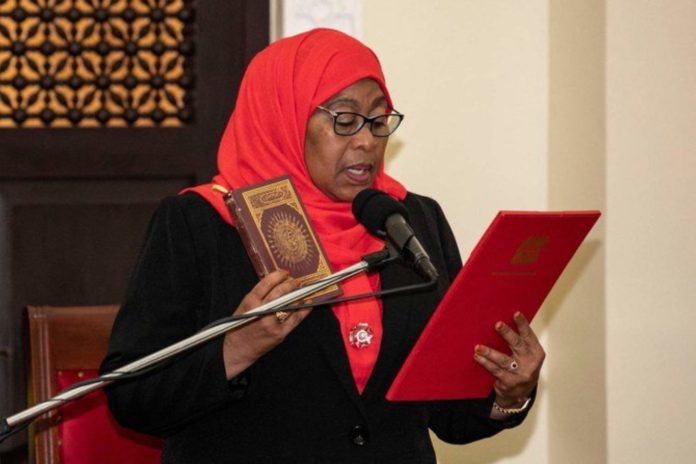Dar es Salaam, Tanzania — In his maiden budget speech in June 2016, Tanzania’s finance minister, Philip Mpango described foreign aid as “toxic.”
Amidst thunderous applause from packed legislators, Mpango said foreign aid can be a conduit of bad policies and projects since the conditions attached to it, potentially cripple the government’s ability to make informed choices.
Worse Than Ineffective
According to the minister, foreign aid was worse than ineffective, perpetuated corruption, and slackened internal revenue collections.
True to his word, the minister spearheaded government’s revenue policies by widening the tax base and improving domestic revenues.
Cutting down foreign aid has been a key government’s objective under President Magufuli, who died of heart complications.
As attested by 2020/21 budget figures, for instance, foreign aid and concessional loans dropped to 8.2 percent compared to over 30% a decade ago.
President Magufuli, known as ‘the bulldozer’ had criticized western countries for imposing humiliating conditions on aid.
Budget Deficits
As one of Africa’s biggest per capita aid recipients, Tanzania has repeatedly experienced yawning budget deficits because development partners invariably failed to fulfill their promises.
Since rising to power, Magufuli’s overarching objective had been to unleash growth potential and addressing the country’s infrastructural bottlenecks in energy, ports, roads, railways as well as honing people skills through education, science and technology to improve lives.
Throughout his leadership, Magufuli steered the country toward authoritarianism by implementing a nationalistic economic agenda characterized by stifled regional and international trade thus affecting foreign direct investment.
The no-nonsense leader went further by silencing dissent—banning statistics that challenged official government data, locking opposition leaders, stifling civil society, and muzzling the media.
His global notoriety peaked during the outbreak of the COVID-19 pandemic when he claimed the deadly virus had been eliminated in Tanzania, thus stopping releasing COVID-19 data.
In a bid to sustain the political legacy of her predecessor, Tanzania’s new president Samia Suluhu Hassan, has promised to tread on the development trajectory that Magufuli initiated.
“I will continue where Magufuli left off and will get to where he envisioned Tanzania to be,” she said during the swearing-in ceremony.
Party Supporter
President Hassan, who becomes east Africa’s second-female president will serve out the remainder of Magufuli’s five-year term until a new election in 2025.
A stalwart of the ruling Chama Cha Mapinduzi (CCM) party from Zanzibar, Hassan served as vice president since 2015.
Her first moves, observers say, are likely to feature an appeal for unity among Tanzanians.
“She’s very much disturbed by the growing division among Tanzanians. She would like to restore unity” said Justine Bigawe, a political analyst based in Dar es Salaam.
According to Bigawe, Hassan will almost certainly seek to consolidate her grip on power.
According to him, as a first-ever female head of state, Hassan stands a chance to raise national confidence that she has the skills and abilities to run the country.
Magufuli, who had been pursuing nationalist policies that prioritize economic development and empowerment of the poor, had attracted criticism on alleged human rights violations.
Armed with relative macroeconomic stability and strong GDP growth, analysts say Magufuli relentlessly and successfully built costly infrastructural projects in his quest to translate economic growth into poverty reduction to deliver sustained improvement of the lives of the poor.
As a reformist, Magufuli’s leadership style portrayed devotion to work, close scrutiny of plans and proposals.
Armed with a philosophy hinged on the assumption that development should be people-centered, Magufuli mobilized resources to finance major development projects without foreign assistance.
Notable Progress
Magufuli’s notable achievements include improvement of social and basic services, reviving the country’s defunct national carrier; Air Tanzania, constructing modern road and railway infrastructures, installation of flyovers, construction of a crude oil pipeline from Uganda, and a hydropower facility to create energy independence.
Magufuli’s unique leadership style earned him praise across Africa, however, his courage to wage sustained war on corruption, drugs, tax evasion, poaching and economic sabotage, opened the door for criticism.
“He was doing the right thing for the country but not everyone was pleased with what he was doing,” said Bigawe
Observers say Magufuli’s leadership style and philosophy was a game-changer in Tanzania and across Africa where local citizens wished to have their own Magufuli’s.
Magufuli plugged loopholes for theft of public funds through questionable transactions, ghost workers, and unnecessary foreign trips by public servants, said Bigawe.
For example, Bank of Tanzania data shows the country saved $429.5 million from foreign travel within a year after Magufuli took office, he said.
Despite being rich in natural resources such as gold, coal, gemstones, etc, the east African country has for decades seen plunder of its natural wealth, consequently affecting the quest for development.
President Magufuli vowed to reverse the trend and ensure that the country gets a reasonable share of the revenue from natural wealth by reviewing mining laws to ensure that future contracts benefit the country, said Bigawe.
According to him, the government under Magufuli had rolled out a cocktail of bold directives, such as introducing new laws intended to boost the country’s revenues from mineral wealth.

